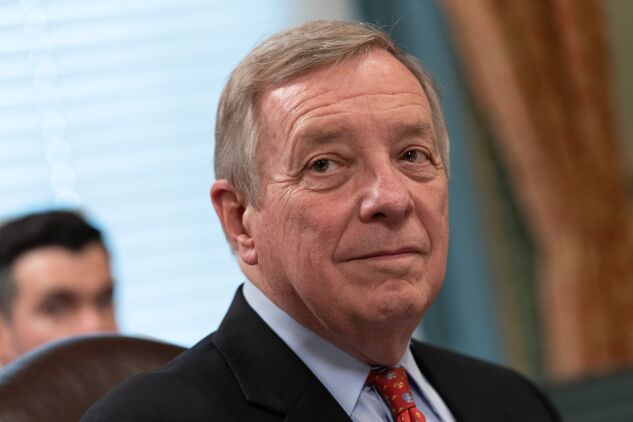- Most senators disclose retirement early in year before election
- Durbin, Risch being watched for possible departures
Welcome to Senate retirement season — the point early in a two-year election cycle when senators often say if they’re running for re-election, seeking some other office, or exiting political life altogether.
Indeed, Jeanne Shaheen (D-N.H.) last week disclosed plans to retire, just the latest in a string of senators who’ve made similar announcements. Mitch McConnell (R-Ky.) and Tina Smith (D-Minn.) revealed their retirements within one week in February, not long after Sen. Gary Peters (D-Mich.) in late January said he would forgo re-election.
About half a dozen elected senators on average retire every two years, and there probably will be more than the four known departures thus far this cycle.
Senate Democratic Whip Dick Durbin (Ill.), 80, is expected to make his political intentions known soon. Illinois has an early primary in March 2026 and many Democrats, including Reps. Raja Krishnamoorthi and Lauren Underwood, may be interested in seeking a seat Durbin could leave open after three decades. In Democratic-friendly Illinois, the party primary may be more consequential than the general election.
“No announcements today,” Durbin said March 12 after Shaheen’s announcement.
Senate Foreign Relations Committee Chair Jim Risch (R-Idaho) also is on the retirement watch list, if only because he’s 81 and a new six-year term would end a few months shy of his 90th birthday. If he retires, Risch surely would be succeeded by a Republican in a state that last elected a Democrat to the Senate in 1974.
Earlier this month, the senator set up a Friends of Jim Risch committee to raise money jointly for his campaign and leadership PAC. Risch’s campaign didn’t return a request for more information about his political plans.
Sens. Ed Markey (D-Mass.), 78, and Jack Reed (D-R.I.), 75, have said they plan to run again.
Giving Notice, Other Offices
More often than not, senators give these heads-ups more that 18 months before the next general election to give prospective successors ample time to raise the money needed to assemble a statewide campaign and, partly, as a professional courtesy to party leaders. House retirements spike later in the cycle.
“We have a deep bench of political talent in Minnesota” and “I’m excited to make room for them to move forward,” Smith said in her retirement announcement.
McConnell divulged his decision on his 83rd birthday Feb. 20, but noted in a Senate floor speech he had actually made up his mind the previous year. His announcement in the last Congress he’d give up his party leadership spot had generated speculation about his election plans.
Of the 41 elected senators who retired in the seven elections between 2012 to 2024, 27 of them announced their decision by the end of the first quarter of the odd-numbered year, according to Bloomberg Government data.
Marsha Blackburn (R-Tenn.) and Tommy Tuberville (R-Ala.) may leave the Senate at the end of next year, though not to retire from political life: they’re considering running for open governorships. Sen. Michael Bennet (D-Colo.), who won a new six-year term in 2022, would resign if he runs for governor and wins.
Read more: Do Governors Have More Fun? Senators Consider Retreating Home
Mike Braun (R-Ind.) made the move from senator to governor in 2024, though the BGOV analysis doesn’t include him among the seven departing senators that cycle who didn’t run for any office. The retirement announcements were less front-loaded: Mitt Romney (R-Utah) in September 2023; Joe Manchin (W.Va.) in December 2023, before the Democrat became an independent; and Kyrsten Sinema (I-Ariz.), another former Democrat, in March 2024.
In the 2022 cycle, five of the six senators who retired said so by the end of March 2021. The exception was Sen. Pat Leahy (D-Vt.), who announced in November 2021 he wouldn’t seek an ninth term. Then-Rep. Peter Welch (D) was well-positioned to succeed Leahy, having won eight statewide elections in tiny Vermont’s at-large congressional district.
— With assistance from
To contact the reporter on this story:
To contact the editors responsible for this story:



